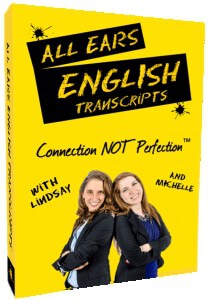
Have you ever found the verb + “ing” part of English to be difficult to understand?
Do you feel unsure of how to say certain verbs in the right way?
Today is our next installment in this grammar series with Aubrey and Lindsay, on how to use infinitives and gerunds.
You will learn the rules around this usage, and the common mistake not to make so that you sound like the natives.
Get Your Transcripts Today!

Make sure you understand every word you hear on All Ears English.
Bring your English to the advanced level with new vocabulary and natural expressions.
Subscribe and get the transcripts delivered by email.
Learn to speak naturally with the American accent.
Click here to subscribe and save 50%
Overcoming A Common Mistake
Do you like to running?
Do you like cooking?
You probably hear questions like this all the time in conversation.
It can be helpful if you notice that in such a question, it was an infinitive used followed by a gerund/verb + ing.
Would it have been acceptable if my question were “Do you enjoy to go running?”
No you can probably even get a feel reading that out loud that it doesn’t flow.
It’s all about learning to use phrases or asking questions in a way that flows properly.
Today we’ll tell you the four categories of verbs when using gerunds and infinitives so you know exactly how to use them.
You might make these common mistakes all the time, and they can be noticeable to natives.
Though they are common mistakes, they can be easy to prevent if you know how to say things the right way.
We talked about telling a story using past progressive to hook your audience earlier in our series.
Now we’re going to look at how to ask a question or say a phrase in a way that is proper and that helps you to stand out as an excellent English speaker.
Breaking This Down
So you might be wondering, how does this all work?
Some verbs must be followed by infinitives (to + root verb; to go, to do, to have), while some must be followed by gerunds.
If you’re not familiar with this term, a gerund is formed when you add “ing” to the end of the verb–this then in turn makes it a noun.
For other verbs it doesn’t matter if you use an infinitive or a gerund, and for some the meaning changes depending on which you use.
You might feel like you are going crazy trying to memorize the lists of verbs like these, but it doesn’t have to be that hard.
The thing to focus on is to remember and practice the most commonly used ones, or the ones you will most likely use.
This is all another example of how you have to move away from just the textbook only, and you start to focus on real life conversations.
This is about real life experiences and knowing how to talk about them, and you will come to understand that through these lessons in this series.
Just one simple change in the way that you ask a question can help you to stand out as an advanced English speaker.
Why Is This Important?
So you saw the differences in the example above.
Though it may seem like a minor difference, it really does matter.
You might be asking yourself why is this so important anyhow?
In the long run you will find that these types of things turn into glaring mistakes.
Some mistakes natives make all the time and it’s not a big deal–but this is not one of them!
Natives rarely make these mistakes because it sounds so off to them, and they can recognize that when they hear it or say it.
If a native were to hear this mistake, it may very well flag that it’s a lower level English learner.
This can actually cause a bit of a miscommunication, and so you want to be sure not to be in that situation.
Learning something like this to be used in real life conversations rather than a textbook is so important to your English speaking.
This will ultimately help you to advance in your English, and ensure that you don’t make such common mistakes along the way.
Understanding These Rules and How They Work
You will find it to be helpful to look at the rules that surround this usage.
Once you see these rules and examples that go along with it, then it all comes together and makes more sense.
- Verbs that must be followed by the infinitive: Examples of this include want, hope, seek (agree, appear, decide, demand, deserve). You could say something like “I want to buy you a gift for your birthday.”
- Verbs that must be followed by the gerund/verb+ing: Examples of this include enjoy, detest (appreciate, avoid, finish, keep, imagine, recommend etc.). You would say something like “I enjoy buying gifts for my friends’ birthdays.”
- Can be followed by either: Examples of this include love, hate (continue, neglect, like, prefer). A good way to say this would be “I love to buy gifts! I love buying gifts!”
- Verbs where the meaning changes if infinitive or gerund is used: This is the most interesting rule and perhaps the most useful. This is where a miscommunication can easily happen. There are many examples of this including stop, forget, remember, regret (begin, keep, need, start, try). You can compare different sentences with similar meanings such as “I stopped eating” vs. “I stopped to eat. ” Another example might be “I regret informing you that I ate the cake” vs. “I regret to inform you that I ate the cake.” You can get a feel for which ones don’t flow properly such as both first examples. This is why these rules are so important, particularly this one.
These rules can help you to get a feel for how this works and how you should be saying such phrases.
It can be helpful to reference these rules and the examples so that you know how to say the right thing in conversation.
Roleplay To Help
A roleplay can really help in this type of situation so that you can see the examples in a real life setting.
In this roleplay, we’ll each make an error so try to see if you can detect it.
Aubrey: “I remember telling you in our last meeting that I would stop arriving late.”
Lindsay: “Yes, if you can avoid doing that, I’d appreciate it. However, you appear improving.” (infinitive after appear – appear to be)
Aubrey: “I tried setting alarms and that seems to be helping.”
Lindsay: “I love to hear that you’ve found a solution!”
Aubrey: “Yes, I want to be dependable. Imagine to be late all the time! When I do that, no one can count on me!” ( gerund after imagine – imagine being)
How do you know which verbs go in each category?
Don’t memorize long lists!
Learn the most commonly used for each category as provided to you, and then work to improve general fluency.
The more you listen to English through things such as news and podcasts, the more you’ll hear these used correctly.
Takeaway
You want to connect with others in a language and that means knowing how to say things the right way!
Your grammar doesn’t have to be perfect , and there are so many mistakes that are not a big deal at all.
This is one of those mistakes that you want to try to avoid though.
If you know how to avoid these common mistakes, it can help you to sound more like a native English speaker.
It is important to remember that correct use of gerunds and infinitives is something you want to make sure you get right.
This error can be very glaring as this error so you want to know how to avoid it.
This is a great way to take your English learning and speaking to a whole new level, so practice it and you can avoid this common mistake.
Listen to another episode in this series on how to write polished emails.
If you have any questions, please leave them below in the comments section.
We’ll get back to you as soon as we can.








